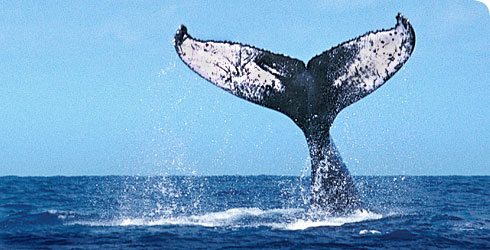Top tips for watching whales
Whales are some of the most magnificent animals on earth. They are the largest of all the mammals and are spectacular creatures to see in the wild.
If you are thinking of going on a whale-watching trip, Trevor Day, author of the Whale Watcher book, has some tips to help make it a success.
- Check which species of whale, dolphin or porpoise you are likely to see. Have you chosen a good time of year, and the best time of day, to go?
- Make sure you join a reputable operator. You want to be safe and you want the wildlife you are watching to be as safe and undisturbed as possible. Does the operator have a good success record? Are they knowledgeable? Are they recommended by wildlife conservation groups?
- Make sure you wear the right clothing (preferably several layers that you can add or remove, as necessary). You need to be warm enough, if it's cold, or protected from the sun's rays, if it's hot.
- Take the right equipment. Ideally, wear polarising sunglasses and take waterproof binoculars (up to 10x magnification) to see 'up close.' A rapid-exposure camera with a zoom lens can help you capture magical moments.
- Research the species you are likely to see. How will you recognise them? What are their distinguishing features and characteristic behaviours?
- To record what you see, take a notepad and pencil, and anything that helps you determine your location, including a local map, compass and, ideally, a GPS location finder.
- Don't forget to take plenty of food and drink.
- When observing, do all you can to allow the whales to behave as naturally as possible, without interference. Whale watching is an 'eyes on, hands off' activity, so don't attempt to touch or feed the animals you see. Stay quiet.
- Make notes of what you see. Record the time, the place and the whales' behaviour. Record-keeping is one of the most rewarding aspects of whale-watching. And you have a real opportunity to add to our understanding of whales and their behaviour.
- Read around the subject and join a wildlife organisation that encourages you to enjoy a lifetime of responsible whale watching.
Toolbox

Our scientists study the snails that host the schistosomiasis parasite, which causes a disease that affects nearly 200 million people.
